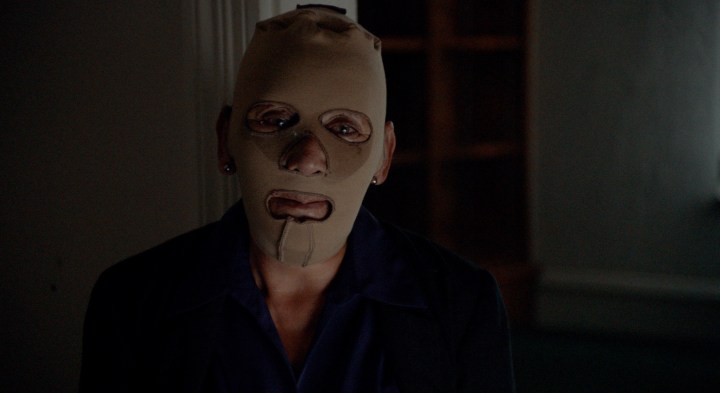‘La Libertad del Diablo’ Is a Haunting Look at Victims and Victimizers of Mexico’s Drug War

'La libertad del diablo' still courtesy of Hola Mexico Film Festival
What would you learn from talking with the victims of Mexico’s violence? What could you gain from chatting with those who have made a living killing in cold blood? What might audiences take away from hearing from both sides in one single documentary? Everardo González‘s La libertad del diablo (Devil’s Freedom) is structured around these questions. Ostensibly made up of interviews with both victims and victimizers, sicarios and police officers, orphaned girls and teenage hit men, González has crafted an eerie portrait of the toll the cycle of violence has wreaked in Mexico. With all of his interviewees donning a nude-colored skin-tight mask with holes for their eyes, nose, mouth and ears that makes them look like expressive beige skulls, the conversations the doc stages are hard to watch and even harder to shake.
At a Q&A following the harrowing doc at the International Film Festival of Panama, González talked at length about the fine line he had to tread while making the film. The choice to leave all of his subjects faceless and nameless, flattening their experiences in the process, was necessary to wrestle the conversations about the violence away from the politics that so often obscures it. “This is not a film that carries a moral takeaway,” he shared. “It was made with the intention of asking questions.” The darkened spaces his subjects occupy as well as the dialogue-free sequences that punctuate these interviews add to the disturbing testimonials you’re hearing — everything from how a mother was ripped from her family while her two young daughters watched to how a young teen admits his face was forever tinged with regret after killing a child for the first time.
Rooted in journalistic practices, La libertad del diablo hopes to engender empathy even as it questions the way we frame the issue of violence in Mexico and elsewhere in Central America. “The spiral of violence you see in Honduras, El Salvador, Guatemala,” he argued — “the only thing it perpetuates is more violence.” And to empathize with those who kill and those who kidnap and those stay silent requires an enormous amount of energy. It’s not and it shouldn’t be easy but González’s film is a stark reminder that the moment we dehumanize victims and victimizers alike is the moment we admit defeat and take this cycle of violence as a norm. Uninterested in easy answers or in letting government institutions and remorseless killers off the hook, La libertad del diablo stages the kind of discussions those on all sides of the conflict so rarely get to have. As González put it — and he really isn’t exaggerating — “Whoever sees the film won’t be able to forget it. Ever.”
La libertad del diablo screens as part of the Hola Mexico Film Festival in Los Angeles on June 2 and 3.